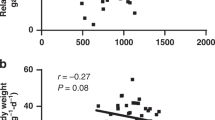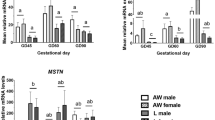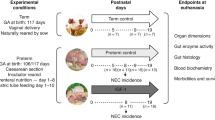Abstract
Background
Postnatal lean mass accretion is commonly reduced in preterm infants. This study investigated mechanisms involved in the blunted feeding-induced activation of Akt in the skeletal muscle of preterm pigs that contributes to lower protein synthesis rates.
Methods
On day 3 following cesarean section, preterm and term piglets were fasted or fed an enteral meal. Activation of Akt signaling pathways in skeletal muscle was determined.
Results
Akt1 and Akt2, but not Akt3, phosphorylation were lower in the skeletal muscle of preterm than in term pigs (P < 0.05). Activation of Akt-positive regulators, PDK1 and mTORC2, but not FAK, were lower in preterm than in term (P < 0.05). The formation of Akt complexes with GAPDH and Hsp90 and the abundance of Ubl4A were lower in preterm than in term (P < 0.05). The abundance of Akt inhibitors, PHLPP and SHIP2, but not PTEN and IP6K1, were higher in preterm than in term pigs (P < 0.05). PP2A activation was inhibited by feeding in term but not in preterm pigs (P < 0.05).
Conclusions
Our results suggest that preterm birth impairs regulatory components involved in Akt activation, thereby limiting the anabolic response to feeding. This anabolic resistance likely contributes to the reduced lean accretion following preterm birth.
Impact
-
The Akt-mTORC1 pathway plays an important role in the regulation of skeletal muscle protein synthesis in neonates.
-
This is the first evidence to demonstrate that, following preterm birth, the postprandial activation of positive regulators of Akt in the skeletal muscle is reduced, whereas the activation of negative regulators of Akt is enhanced.
-
This anabolic resistance of Akt signaling in response to feeding likely contributes to the reduced accretion of lean mass in premature infants.
-
These results may provide potential novel molecular targets for intervention to enhance lean growth in preterm neonates.
This is a preview of subscription content, access via your institution
Access options
Subscribe to this journal
Receive 14 print issues and online access
$259.00 per year
only $18.50 per issue
Buy this article
- Purchase on Springer Link
- Instant access to full article PDF
Prices may be subject to local taxes which are calculated during checkout




Similar content being viewed by others
Data availability
The datasets supporting the findings of this study are available from the corresponding author upon reasonable request.
References
Barfield, W. D. Public health implications of very preterm birth. Clin. Perinatol. 45, 565–577 (2018).
Peila, C. et al. Extrauterine growth restriction: definitions and predictability of outcomes in a cohort of very low birth weight infants or preterm neonates. Nutrients 12, 1224–1234 (2020).
Platt, M. J. Outcomes in preterm infants. Public Health 128, 399–403 (2014).
Koontz, M. B., Gunzler, D. D., Presley, L. & Catalano, P. M. Longitudinal changes in infant body composition: association with childhood obesity. Pediatr. Obes. 9, e141–e144 (2014).
Kajantie, E., Osmond, C., Barker, D. J. & Eriksson, J. G. Preterm birth–a risk factor for type 2 diabetes? The Helsinki Birth Cohort Study. Diabetes Care. 33, 2623–2625 (2010).
Ahmad, I. Body composition and its components in preterm and term newborns: a cross-sectional, multimodal investigation. Am. J. Hum. Biol. 22, 69–75 (2010).
Davis, T. A. & Fiorotto, M. L. Regulation of muscle growth in neonates. Curr. Opin. Clin. Nutr. Metab. Care. 12, 78–85 (2009).
Davis, T. A. et al. Stimulation of protein synthesis by both insulin and amino acids is unique to skeletal muscle in neonatal pigs. Am. J. Physiol. Endocrinol. Metab. 282, E880–E890 (2002).
Suryawan, A. et al. Activation by insulin and amino acids of signaling components leading to translation initiation in skeletal muscle of neonatal pigs is developmentally regulated. Am. J. Physiol. Endocrinol. Metab. 293, E1597–E1605 (2007).
Naberhuis, J. K. et al. Prematurity blunts the feeding-induced stimulation of translation initiation signaling and protein synthesis in muscle of neonatal piglets. Am. J. Physiol. Endocrinol. Metab. 317, E839–E851 (2019).
Rudar, M. et al. Prematurity blunts the insulin- and amino acid-induced stimulation of translation initiation and protein synthesis in skeletal muscle of neonatal pigs. Am. J. Physiol. Endocrinol. Metab. 320, E551–E565 (2021).
Blanco, C. L. et al. Peripheral insulin resistance and impaired insulin signaling contribute to abnormal glucose metabolism in preterm baboons. Endocrinology 156, 813–823 (2015).
Gonzalez, E. & McGraw, T. E. The Akt kinases: isoform specificity in metabolism and cancer. Cell Cycle 8, 2502–2508 (2009).
Gao, Y., Moten, A. & Lin, H.-K. Akt: a new activation mechanism. Cell Res. 24, 785–786 (2014).
Lien, E. C., Dibble, C. C. & Toker, A. PI3K signaling in cancer: beyond AKT. Curr. Opin. Cell Biol. 45, 62–71 (2017).
Sarbassov, D. D., Guertin, D. A., Ali, S. M. & Sabatini, D. M. Phosphorylation and regulation of Akt/PKB by the rictor-mTOR complex. Proc. Natl Acad. Sci. USA 97, 10832–10837 (2000).
Gupta, A. & Dey, C. S. PTEN and SHIP2 regulates PI3K/Akt pathway through focal adhesion kinase. Mol. Cell. Endocrinol. 309, 55–62 (2009).
Oudart, J. B. et al. The anti-tumor NC1 domain of collagen XIX inhibits the FAK/ PI3K/Akt/mTOR signaling pathway through alphavbeta3 integrin interaction. Oncotarget 7, 1516–1528 (2016).
Zhao, Y. et al. Ubl4A is required for insulin-induced Akt plasma membrane translocation through promotion of Arp2/3-dependent actin branching. Proc. Natl Acad. Sci. USA 112, 9644–9649 (2015).
Liao, Y. & Hung, M.-C. Physiological regulation of Akt activity and stability. Am. J. Transl. Res. 2, 19–42 (2010).
Carnero, A., Blanco-Aparicio, C., Renner, O., Link, W. & Leal, J. F. The PTEN/PI3K/AKT signalling pathway in cancer, therapeutic implications. Curr. Cancer Drug. Targets 8, 187–198 (2008).
Azzi, A. SHIP2 inhibition alters redox-induced PI3K/Akt and MAP kinase pathways via PTEN over-activation in cervical cancer cells. FEBS Open Biol. 10, 2191–2205 (2020).
Seshacharyulu, P., Pandey, P., Datta, K. & Batra, S. K. Phosphatase: PP2A structural importance, regulation and its aberrant expression in cancer. Cancer Lett. 335, 9–18 (2013).
Chakraborty, A. et al. Inositol pyrophosphates inhibit Akt signaling, thereby regulating insulin sensitivity and weight gain. Cell 143, 97–910 (2010).
Jacquin, M. A. et al. GAPDH binds to active Akt, leading to Bcl-xL increase and escape from caspase-independent cell death. Cell Death Differ. 20, 1043–1054 (2015).
Sato, S., Fujita, N. & Tsuruo, T. Modulation of Akt kinase activity by binding to Hsp90. Proc. Natl Acad. Sci. USA 97, 10832–10837 (2000).
Zhang, Q. & Claret, F. X. Phosphatases: the new brakes for cancer development? Enzym. Res. 2012, 659649 (2012).
Burrin, D. G. et al. Translational advances in pediatric nutrition and gastroenterology: new insights from pig models. Ann. Rev. Anim. Biosci. 8, 321–335 (2020).
Williamson, D. L. Altered nutrient response of mTORC1 as a result of changes in REDD1 expression: effect of obesity vs. REDD1 deficiency. J. Appl. Physiol. 117, 246–256 (2014).
Du, K. & Tsichlis, P. N. Regulation of the Akt kinase by interacting proteins. Oncogene 24, 7401–7409 (2005).
Gao, T., Furnari, F. & Newton, A. C. PHLPP: a phosphatase that directly dephosphorylates Akt, promotes apoptosis, and suppresses tumor growth. Mol. Cell 18, 13–24 (2005).
Hay, W. W. Jr Optimizing nutrition of the preterm infant. Zhongguo Dang Dai Er Ke Za Zhi 19, 1–21 (2017).
Glass, D. J. PI3 kinase regulation of skeletal muscle hypertrophy and atrophy. Curr. Top. Microbiol. Immunol. 346, 267–278 (2010).
Wilson, F. A. et al. Feeding rapidly stimulates protein synthesis in skeletal muscle of the neonatal pig by enhancing translation initiation. J. Nutr. 139, 1873–1880 (2009).
Hers, I., Vincent, E. E. & Tavaré, J. M. Akt signalling in health and disease. Cell Signal. 23, 1515–1527 (2011).
Matheny, R. W. Jr. et al. Akt2 is the predominant Akt isoform expressed in human skeletal muscle. Physiol. Rep. 6, 1–8 (2018).
Manning, B. D. & Alex Toker, A. Akt/PKB signaling: navigating the network. Cell 169, 381–405 (2017).
Toker, A. & Cantley, L. C. Signalling through the lipid products of phosphoinositide-3-OH kinase. Nature 387, 673–676 (1997).
Paul, R. et al. FAK activates Akt-mTOR signaling to promote the growth and progression of MMTV-Wnt1-driven basal-like mammary tumors. Breast Cancer Res. 22, 59–73 (2020).
Yun, B.-G. & Matts, R. L. Hsp90 functions to balance the phosphorylation state of Akt during C2C12 myoblast differentiation. Cell Signal. 17, 1477–1485 (2005).
Georgescu, M. M. PTEN tumor suppressor network in PI3K-Akt pathway control. Genes Cancer 1, 1170–1177 (2010).
Pan, Q., Wu, J., Liu, Y., Li, X. & Chen, J. Involvement of hepatic SHIP2 and PI3K/Akt signalling in the regulation of plasma insulin by xiaoyaosan in chronic immobilization-stressed rats. Molecules 24, 480–496 (2019).
Millward, T. A., Zolnierowicz, S. & Hemmings, B. A. Regulation of protein kinase cascades by protein phosphatase 2A. Trends Biochem. Sci. 24, 186–191 (1999).
Sangodkar, J. et al. All roads lead to PP2A: exploiting the therapeutic potential of this phosphatase. FEBS J. 283, 1004–1024 (2016).
Zhang, Z. et al. Inositol pyrophosphates mediate the effects of aging on bone marrow mesenchymal stem cells by inhibiting Akt signaling. Stem Cell Res. Ther. 5, 33–45 (2014).
Acknowledgements
This work is a publication of the USDA/ARS Children’s Nutrition Research Center, Department of Pediatrics, Baylor College of Medicine. The contents of this publication do not necessarily reflect the views or policies of the USDA, nor does the mention of trade names, commercial products, or organization imply endorsement by the US government. We thank H.V. Nguyen and R.D. Parada for expert technical assistance and the staff of the Comparative Nutrition Research Facility for animal care.
Funding
This work was supported by the National Institute of Child Health and Human Development Grants HD-085573 (T.A.D.), HD-072891 (T.A.D.), HD-099080 (T.A.D. and M.L.F.), USDA Current Research Information System Grant 3092-51000-060 (T.A.D.), and USDA National Institute of Food and Agriculture Grant 2013-67015-20438 (T.A.D.).
Author information
Authors and Affiliations
Contributions
A.S., M.L.F., and T.A.D. conceived and designed the research; A.S., M.R., and J.K.N. performed experiments; A.S. and M.R. analyzed data; A.S., M.R., J.K.N., and M.L.F. interpreted the results of experiments; A.S. drafted the manuscript; A.S., M.R., J.K.N., M.L.F., and T.A.D. edited and revised the manuscript; A.S., M.R., J.K.N., M.L.F., and T.A.D. approved the final version to be published.
Corresponding author
Ethics declarations
Competing interests
The authors declare no competing interests.
Ethics approval and consent to participate
Patient consent was not required.
Additional information
Publisher’s note Springer Nature remains neutral with regard to jurisdictional claims in published maps and institutional affiliations.
Rights and permissions
Springer Nature or its licensor (e.g. a society or other partner) holds exclusive rights to this article under a publishing agreement with the author(s) or other rightsholder(s); author self-archiving of the accepted manuscript version of this article is solely governed by the terms of such publishing agreement and applicable law.
About this article
Cite this article
Suryawan, A., Rudar, M., Naberhuis, J.K. et al. Preterm birth alters the feeding-induced activation of Akt signaling in the muscle of neonatal piglets. Pediatr Res 93, 1891–1898 (2023). https://doi.org/10.1038/s41390-022-02382-4
Received:
Revised:
Accepted:
Published:
Issue Date:
DOI: https://doi.org/10.1038/s41390-022-02382-4



